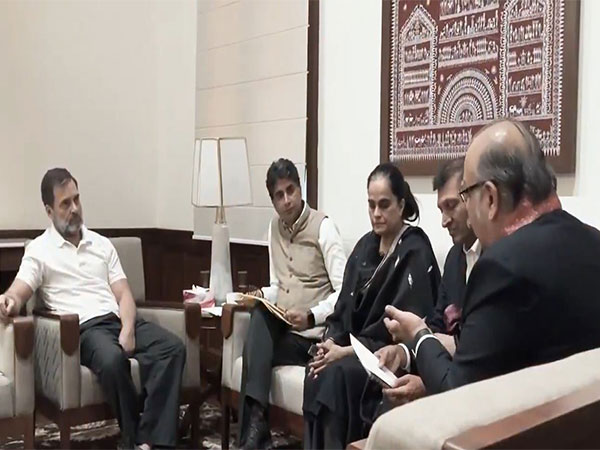ANI |
Updated: Dec 05, 2024 23:15 IST
New Delhi [India], December 5 (ANI): Congress leader and Lok Sabha Leader of Opposition, Rahul Gandhi on Thursday, met with a delegation of citizens and environment experts to discuss the issue of air pollution in the country
He also assured them of raising the issue of pollution in the Parliament and advocate for bringing “swift action” on their demands.
The delegation of “concerned citizens” and experts, included Dr Sanjeev Bagai environmentalists Jai Dhar Gupta and Vimlendu Jha, and Bhavreen Khandari who presented a petition to Rahul Gandhi urging “immediate action” on the matter, the Congress party stated.
The delegation also proposed concrete solutions to mitigate the public health emergency.
“A delegation of concerned citizens and experts, including Dr. Sanjeev Bagai, environmentalists Jai Dhar Gupta and Vimlendu Jha, and Bhavreen Khandari met with the LoP Shri @RahulGandhi to address the worsening air pollution crisis,” the official handle of the Congress posted on X.
“They presented a petition urging immediate action and proposed concrete solutions to mitigate the public health emergency. Rahul ji assured the delegation that he would raise the issue in Parliament and advocate for swift action on their demands, prioritising the health and well-being of citizens and the environment,” it added.
A delegation of concerned citizens and experts, including Dr. Sanjeev Bagai, environmentalists Jai Dhar Gupta and Vimlendu Jha, and Bhavreen Khandari met with the LoP Shri @RahulGandhi to address the worsening air pollution crisis. They presented a petition urging immediate… pic.twitter.com/KuIHsTo6YV
— Congress (@INCIndia) December 5, 2024
Earlier, Rahul Gandhi raised concern over the issue of air pollution in the northern part of India, and termed it a “national emergency.”
Taking to social media platform X, the Rae Bareli MP highlighted that the situation was a “public health crisis” affecting the entire region, “stealing children’s future” and “suffocating the elderly.”
He further pointed out that the pollution was not only harming public health but also contributing to an environmental and economic disaster. He emphasised that the poorest sections of society are suffering the most, unable to escape the polluted air and noted that children are falling ill and many lives are being shortened due to exposure to the harmful air.
“Air pollution in North India is a national emergency–a public health crisis that is stealing our children’s future and suffocating the elderly, and an environmental and economic disaster that is ruining countless lives. The poorest among us suffer the most, unable to escape the toxic air that surrounds them. Families are gasping for clean air, children are falling sick, and millions of lives are being cut short,” Gandhi has said on X.
The Lok Sabha Leader of the Opposition also mentioned the decline in tourism and the negative effect on India’s global reputation, further calling for a collective response to the pollution crisis and urging governments, companies, experts, and citizens to work together to address the issue.
“Tourism is declining and our global reputation is crumbling. The cloud of pollution covers hundreds of kilometres. Cleaning it up will need major changes and decisive action–from governments, companies, experts and citizens. We need a collective national response, not political blame games,” he said.
Meanwhile, hours after the Supreme Court permitted the relaxation of GRAP Stage IV restrictions in Delhi-NCR to GRAP Stage II, the Commission for Air Quality Management (CAQM) on Thursday revoked Stages IV and III of GRAP in the region.
However, GRAP Stages II and I will continue to remain in force across the entire NCR.
In a post on X, the CAQM stated: “The Hon’ble Supreme Court, in its hearing today, based on the air quality data placed before it, observed and permitted CAQM to revoke Stage IV but not to go below Stage II of GRAP for the present.”
“The subcommittee has decided to revoke Stage IV and Stage III of GRAP in the entire NCR with immediate effect. GRAP Stages II and I, however, remain in force across the region,” the post further read.
This decision followed the Supreme Court’s observation that the Air Quality Index (AQI) had improved, allowing a relaxation of GRAP Stage IV restrictions to Stage II. (ANI)
